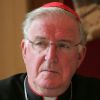Britain legalizes modifying germ line to fight disease
MANCHESTER, England - Britain has become the first country in the world to legalize the genetic modification of the human germ line in an attempt to fight inherited diseases, but Catholic officials oppose the procedures.
CANTERBURY, England - Members of Parliament voted Tuesday (Feb. 3) to allow the creation of human embryos from the DNA of three people to try to eradicate a type of genetic disease that has caused the deaths of thousands of babies.
MANCHESTER, England - Twenty-one Catholic members of Parliament have written to Pope Francis to ask him to relax the rule on priestly celibacy for Latin-rite priests.
MANCHESTER, England - Pope Benedict XVI personally intervened to prevent a British cardinal from occupying political office when he retired from active ministry, the cardinal said.
Cardinal Cormac Murphy-O'Connor, retired archbishop of Westminster, said the British government was considering appointing him as a member of the House of Lords after he reached 75, the retirement age for bishops and cardinals. However, Pope Benedict opposed the idea because he did not wish to set a precedent that might have been copied by bishops in South America and Africa who wished to join the governments of their countries, the cardinal said in an interview published by the London-based Sunday Telegraph.
Under Church law, Canon 285 prohibits clerics from holding political office.
"The idea was quite attractive," Murphy-O'Connor, 80, told the newspaper.
"I consulted the Pope and his chief advisor and they were against it. It's to do with having the freedom to be outside the political system."
Asked if the Pope had personally blocked him from becoming a Lord, the cardinal answered: "Yeah, more or less."
The British Constitution allows Anglican bishops to sit as "lords spiritual" or "spiritual peer" in the House of Lords in a practice that pre-dates the Reformation. It would be normal for the archbishop of Canterbury to join the House of Lords on retirement as leader of the worldwide Anglican Communion.
Murphy-O'Connor said he was tempted to become a spiritual peer, in which he would have been given the title "Lord," after his 2009 retirement from Westminster because he saw the need for Christians to be active in public life.
The cardinal also discussed his views on religion and its role in modern society in the interview.
"Christianity is important in this country," he told the newspaper. "It has to stand up for itself in the face of secularism. We must be brave enough to speak intelligently about what we believe. We must combat aggressive secularism, because it is dangerous."
The cardinal added: "Nobody is obliged to be a Christian, but no one should be obliged to live according to the new secular religion, which says it alone decides what's right."




